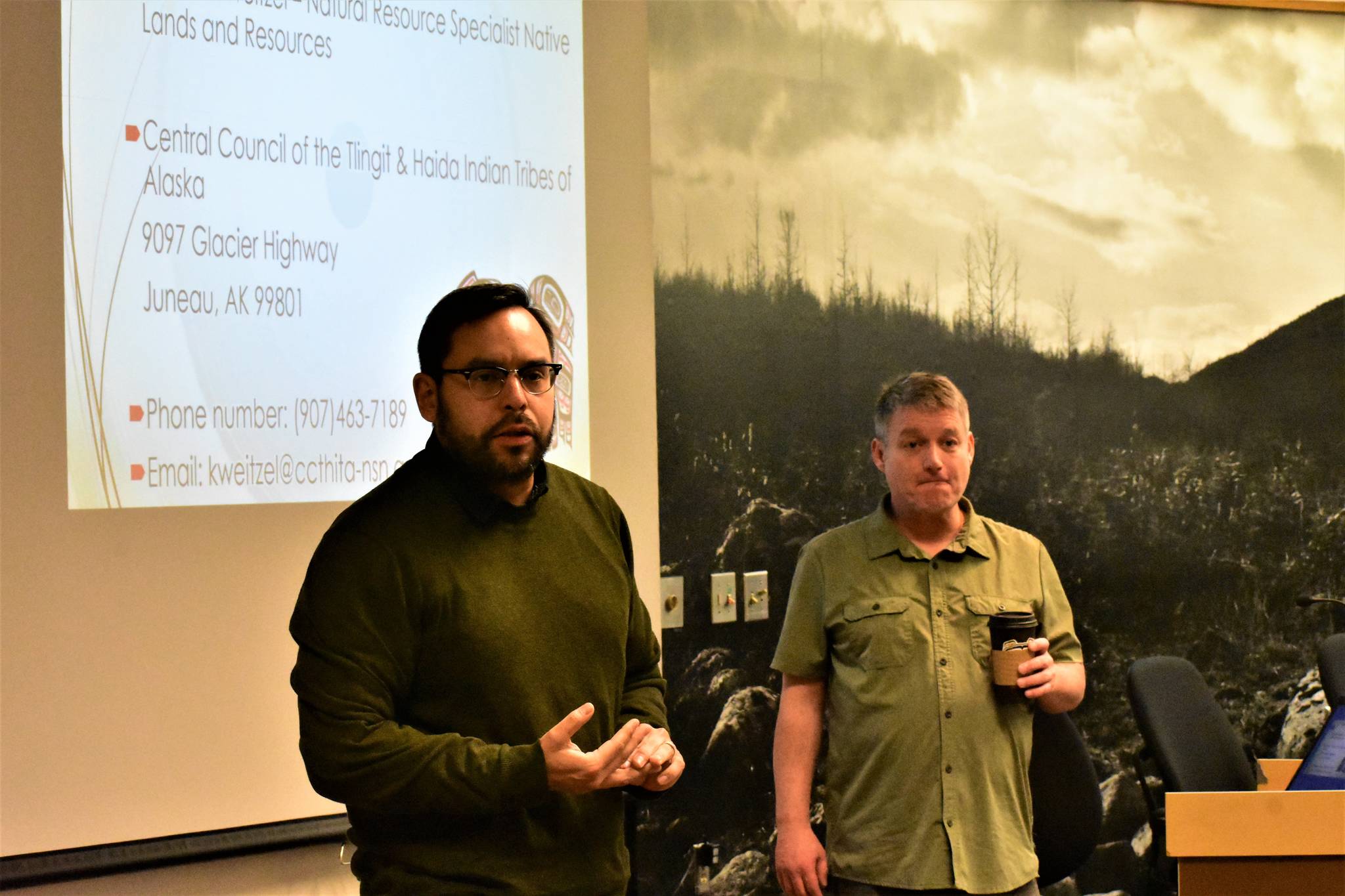Earlier this year, Central Council of the Tlingit & Haida Indian Tribes of Alaska put together a report documenting the effects of climate change throughout Southeast Alaska.
They called it the Climate Change Adaptation Plan, and Wednesday night before a crowd of about 30 people, Kenneth Weitzel, natural resource specialist for Central Council presented the plan’s findings.
In short: it’s not great.
“PSP levels, that’s Paralytic Shellfish Poisoning, are up throughout the entire Gulf of Alaska,” Weitzel said. “Warming ocean temperatures are negatively affecting food sources in Southeast Alaska.”
The Adaptation Plans says that Alaska’s coastal waters are more susceptible to ocean acidification because cold water can absorb more CO2 than warmer waters. The plan also says that shellfish habitats are changing because of warming waters.
“Concerns come primarily from changing habitat conditions due to warming water temperatures, increasing ocean acidity, and isostatic adjustment,” the plan says. “Rising temperatures will favor more heat tolerant shellfish species, increase overall suffering from thermal stress, and decreased burrowing activity.”
Shellfish have been an integral part of tribal life for Tlingit and Haida people, in addition to providing protein and other nutrients.
Scientists for Central Council have been collecting data due to the lack of climate change information specific to Southeast Alaska.
[‘Things are shifting’: Five Alaska Natives tell their stories about climate change.]
“In a national technical report on climate change, there were only two pages on Southeast Alaska and climate change impacts,” the introduction to the report says. The report does not say which national report it’s referring to.
Now that data has been compiled, Central Council wants to spread that information to as many people as they can. Wednesday’s meeting was one of several being held throughout Southeast. Weitzel said he recently gave the same talk in Haines and was on his way to the Organized Village of Kake.
The plan itself is fairly light on actionable items, but this is just the beginning, according to Raymond Paddock, Environmental Coordinator for Central Council.
“We’re just now finishing, as things start moving on we’ll start reaching out to many organizations,” he said. “Basically, we lack dollars in order to accomplish a lot of these (projects). It’s a shared effort.”
Paddock told the crowd he didn’t want to go into too much detail but “we’ve got some big and exciting projects down the line.”
In an interview with the Empire, Paddock said that while the plan focused on things important to the tribe itself, climate change is something that affects everyone.
“It is a tribal issue,” Paddock said. “But in Southeast Alaska people live off the land here too, it goes beyond just being a tribal citizen issue. This is a whole regional effort, it’s a bigger picture than just the tribe.”
Weitzel said he felt it was important to record current conditions to use as a reference for future study. The plan lists a number of species that are key areas of concern. Top priorities for Weitzel were, “salmon, cedar, shellfish,” he said.
“Look at how late everything came in,” he said. “The water was too hot, streams were too warm, there was no snow to ice them down.”
Warm waters this summer were blamed for a massive salmon die off in August. In July, the Associated Press reported warms waters were suspected to have caused parasites in Salmon near Bethel.
“We’re looking for a base-line and we’re hoping to keep it that way,” he said.
[Tlingit and Haida commissioned a climate change report for Southeast Alaska. Here’s what they found.]
The Adaptation Plan was compiled with a number of different groups and agencies, including the University of Alaska and the Southeast Alaska Tribal Ocean Research, or SEATOR lab in Sitka. Central Council hopes to work with a number of other tribes and organizations to really pick through the data and develop clear strategies.
“We’re right now just base-line data collecting, the analysis comes later,” Paddock said.
The Forest Service has contributed data to the plan but Paddock said that federal agencies can’t be counted on like they once were for funding.
“Back in the Obama era, there was a lot of support with the EPA, reviewing our Adaptation Plan and helping us out as well,” he said. “With this current administration, it makes it a little bit harder as they’re not wanting to identify (climate change) as an issue, so they’ve kind of taken a step back in that regard.”
President Donald Trump has expressed skepticism that global warming is man-made, and his administration has made efforts to downplay the effects of climate change. In September, The New York Times identified 85 environmental regulations being rolled back under the Trump administration.
But neither Paddock nor Weitzel seemed daunted.
“I think we’re the vanguards,” Weitzel said, saying that few other organizations had created such an ambitious plan. “These were the first baby steps to make things official. We’re the tip of the sword.”
• Contact reporter Peter Segall at 523-2228 or psegall@juneauempire.com.

